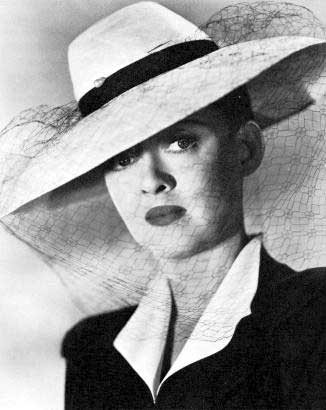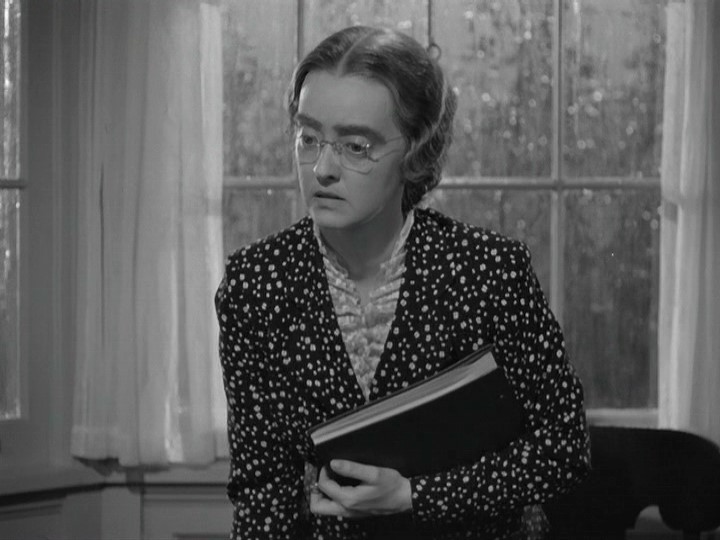Now, Voyager 1942
Now, Voyager is probably my favorite weepy romance film ever. There are a lot of really great tearjerker romances out there, but I think that Now, Voyager takes the cake. The story, the cast, their acting, and especially the teaming of Bette Davis and Paul Henried give it that little bonus that gives it that win by a nose.
Bette Davis plays Charlotte Vale, the daughter of the most famous and wealthy families in Boston. At first glance, you'd think she's middle-aged, but surprisingly, she's quite a young woman. Years of miserable living under her tyrannical mother's reign have led her to become totally spinsterish. She finally cracks under all her unhappiness and goes through a nervous breakdown. Fortunately, kind and sympathetic Dr. Jasquith (Claude Rains) takes Charlotte to his sanitarium where she can recover, and then sends her on a South American cruise to learn how to socialize and give her a shot at making friends with people who have no idea who she is. While on the boat, she meets Jerry Durrance, a man who is unhappily married and staying with his wife for the sake of their daughters. He helps coax her out of her shell and the two end up falling in love. But how long can it last?
Aside from being supremely romantic and wonderfully gushy, Now, Voyager is the perfect example of Bette
Davis's incredible glamor. Never conventionally pretty, Bette Davis was living, breathing, glamor incarnate. And in this film, her transformation from ugly duckling to swan is just as amazing as The Wizard of Oz going from sepia to Technicolor, and just as astounding each time it's seen.
Now, Voyager is one of those sentimental romance films that you really cannot watch without a box of tissues on hand. I think everything about it is great, and side-by-side with Casablanca it leads the way of great romance films of the World War II years.
Bette Davis plays Charlotte Vale, the daughter of the most famous and wealthy families in Boston. At first glance, you'd think she's middle-aged, but surprisingly, she's quite a young woman. Years of miserable living under her tyrannical mother's reign have led her to become totally spinsterish. She finally cracks under all her unhappiness and goes through a nervous breakdown. Fortunately, kind and sympathetic Dr. Jasquith (Claude Rains) takes Charlotte to his sanitarium where she can recover, and then sends her on a South American cruise to learn how to socialize and give her a shot at making friends with people who have no idea who she is. While on the boat, she meets Jerry Durrance, a man who is unhappily married and staying with his wife for the sake of their daughters. He helps coax her out of her shell and the two end up falling in love. But how long can it last?
Aside from being supremely romantic and wonderfully gushy, Now, Voyager is the perfect example of Bette
Davis's incredible glamor. Never conventionally pretty, Bette Davis was living, breathing, glamor incarnate. And in this film, her transformation from ugly duckling to swan is just as amazing as The Wizard of Oz going from sepia to Technicolor, and just as astounding each time it's seen.
Now, Voyager is one of those sentimental romance films that you really cannot watch without a box of tissues on hand. I think everything about it is great, and side-by-side with Casablanca it leads the way of great romance films of the World War II years.




Thanks for this, Mrs. Charles. I saw when was on TCM a few nights ago but was already cried out from The Way We Were and Love Affair. And one thing I don't like about this era is the awful hairstyles -- I know everyone was going short so Veronica Lake fans wouldn't catch their hair in the war machinery gears, but with her weird teeth and Peter Lorre eyes and then that whole forehead exposed and hair twisting up like some Dr. Seuss-meets-Basil Wolverton caricature, I thought I was in some alternate reality. THat's not to deny the power of this film, though for me the real chemistry is between Davis and the ugly duckling daughter,
ReplyDelete